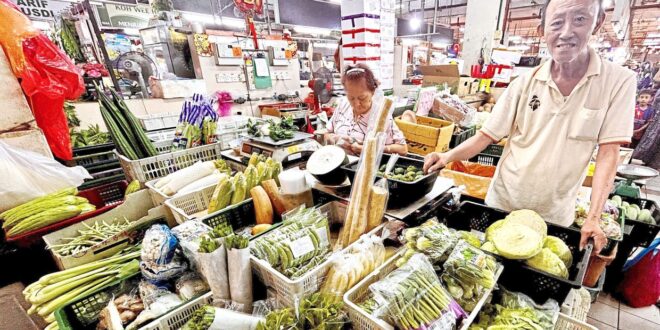JOHOR BARU: Almost two weeks after the government started floating the retail price of diesel, traders and consumers say they are seeing an increase in the prices of goods across the board.
Some of the traders urged the government to look at the entire supply chain, pointing out that suppliers too should be held accountable for the price hikes.
A trader who deals with spices here said prices have shot up by between 70% and 80%.
S. Sudev, owner of a spice shop, said he has received numerous complaints from his customers following a hike in prices, which are set by the suppliers.
“Before June 10 (when the diesel price was floated), the price of black pepper was RM25 per kg and now it has jumped to RM45 per kg.
“The same goes for white pepper; from RM32 per kg previously, it’s now RM55,” he said.
“If we price the items too high, customers will run away and we will not be able to sustain our business,” he added.
The 49-year-old said that with RON95 petrol possibly going to cost more as well, he hopes the Domestic Trade and Cost of Living Ministry (KPDN) will intervene in the matter.
Pasar Awam Larkin Association chairman Sadam Salim said the sellers are not entirely to blame for the latest price increase.
“In general, there are items that have become more expensive but this is something inevitable because we depend on the suppliers.
“We want KPDN to ensure that the suppliers are also held accountable,” he said.
Sadam said one kg of carrot was previously sold at RM15, but now the price has soared to RM24. However, some stalls are selling it at RM18 per kg.
The 32-year-old, who owns a drinks stall, said the difference in prices is due to the rates set by the suppliers.
“It’s unfair to just look at sellers for profiteering. The government should look at the entire supply chain,” he said, adding that his main product is fresh coconut juice, which was priced at RM3.70 this week, up from RM3.
Asked whether he has lodged a complaint with KPDN, Sadam said the association is ever ready to cooperate with the authorities to help the sellers navigate through these challenging times.
Shopowner Ng Peok Mong, 76, said that so far, the prices of his vegetables have not changed much except for cabbage, ginger and tomatoes.
“We get our supplies from Cameron Highlands, so vegetables like water spinach, long beans and Japanese choy sum, which are currently in abundance, are sold at a lower price.
“For example, the Japanese choy sum, which was previously RM5 per kg, costs only RM3.50 per kg now. On the other hand, cabbage was previously RM3 per kg, but the price has doubled.
“What we do is choose suppliers who offer the lowest prices since they have to compete among themselves,” he said.
Meanwhile, consumer S. Jayanthi, 41, said her food expenses have spiked from RM400 to RM700 per month.
“Every two weeks or so, I will stock up on supplies for my child, which cost about RM200.
“But after the removal of the diesel subsidy, my expenses have increased to over RM300 for two weeks,” said the factory operator who earns about RM2,000 a month.
Her husband’s salary helps to cover other expenses, she added.
Another consumer, mother-of-seven Hoe Kai Lin, 37, is expecting her expenses to rise to almost RM4,000 per month.
Her youngest is 19 months old while the eldest is 19. Six of them are still in school.
“I drive a diesel-powered Hilux. Previously, I only spent about RM120 for a full tank but now, it’s RM180,” she said, adding that she drives her children to and from school daily.
As for civil servant Nur Liyana Nabilah Zulkarnain, 24, 40% of her monthly pay of RM1,700 goes towards daily necessities.
She has four siblings, three of whom still go to school while one is bedridden.
“My personal expenses were already high but after June 10, it has become much higher,” she said, adding that she is thankful to be able to help her parents alleviate their burden.
Johor KPDN director Lilis Saslinda Pornomo said the department is always open to discussions with any groups regarding the prices of goods.
She said the written notice under Section 21 of the Price Control and Anti-Profiteering Act 2011 was never issued to persecute sellers.
“Any written notice will only be issued based on public complaints or if we notice any price increase on certain items.
“They are then given about a week to reply and justify the offered price.
“They can include all relevant documents, including the invoice they received from the suppliers. Only then will we calculate whether there is any profiteering,” she explained.
Domestic Trade and Cost of Living Minister Datuk Armizan Mohd Ali has said 209 notices have been issued to sellers under the Act between June 10 and 19.
The notices were issued under Ops Kesan 2.0 to study the impact of the implementation of targeted diesel subsidy.
 BeritaKini.biz Berita Viral Terkini di Malaysia
BeritaKini.biz Berita Viral Terkini di Malaysia





